Like many horse owners around the country, Dan Steers is looking forward to getting back out and about after 18 months of interruptions. As the Australian arm of Double Dan Horsemanship, he shares with us his tips on ensuring our horses are sound, fit and mentally ready for when the action commences – whether it’s a young horse heading out for the first time, or a seasoned campaigner returning to the ring after an extended hiatus.
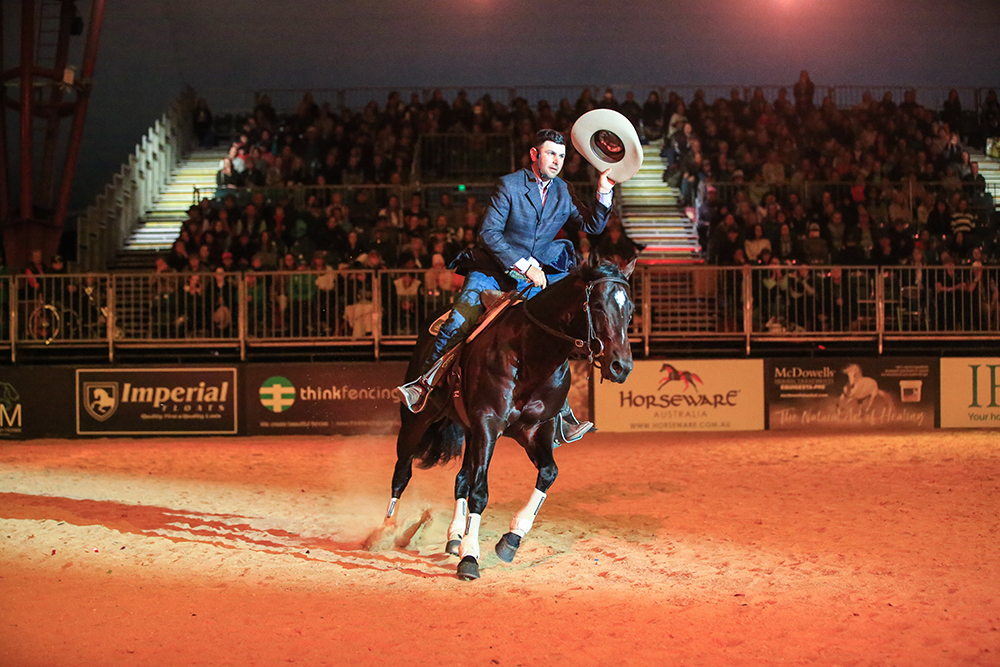
“The entertainment horses are
looking a little shabby.”
“It’s been busy, but just a different busy than what we’re used to,” says Dan of the last 18 months. The Kootingal-based horseman hasn’t done a large-scale entertainment show such as Equitana since February last year, and while these shows are not the bulk of his day-to-day work, they are the hallmark of Double Dan Horsemanship – a business he and good friend Dan James began back in 2009. “The entertainment horses are looking a little shabby at the moment, with no rugs and tails and manes that need a bit a bit of a groom!” laughs Dan. Even clinics, which he normally runs regularly, have been conducted in a limited capacity between lockdowns.
However, time gained through lack of clinics and shows has quickly been converted to starting clients’ horses under saddle and preparing others for possible competitions. At present there are around 50 horses on the property, with Dan noting probably half are his: “I don’t like to count them anymore!” Each day, usually 16 to 18 horses are worked, with the help of a new assistant trainer and also a new trainee who’s helping to start the young ones under saddle.
Preparing clients’ horses with competitions in mind hasn’t been without its pandemic-induced challenges. “It’s difficult when you’re getting ready for some of the more major events and then they get cancelled two to three months before… it hasn’t given clients and owners as much confidence in preparing horses,” explains Dan. That being said, he notes that competition cancellations weren’t always met with disappointment during an unusually cold, wet winter in the Tamworth region. “Sometimes when those shows were getting cancelled, it didn’t disappoint me too much to have a couple of days inside by the fire catching up on office work!” he laughs.
In a normal year, Dan would have visited business partner Dan James in the USA and also travelled to New Zealand for clinics and shows; of course, international travel has been off the cards. While Dan James hasn’t had his business partner and friend over in some time, he has been keeping busy in the States working on an exciting project with the Canadian-based Heartland television series. In the past, he has worked with some of the actors and actresses in the series, and indirectly trained some of the horses – if you have seen liberty horses in Heartland, there’s a good chance they’ve been started under his tutelage. “In this current series, there’s a whole episode featured on Dan [James’] horses. He spent three weeks in Canada filming for one episode, so they have put a lot of effort and budget into producing it,” explains Dan. Heartland fans, keep your eyes peeled!
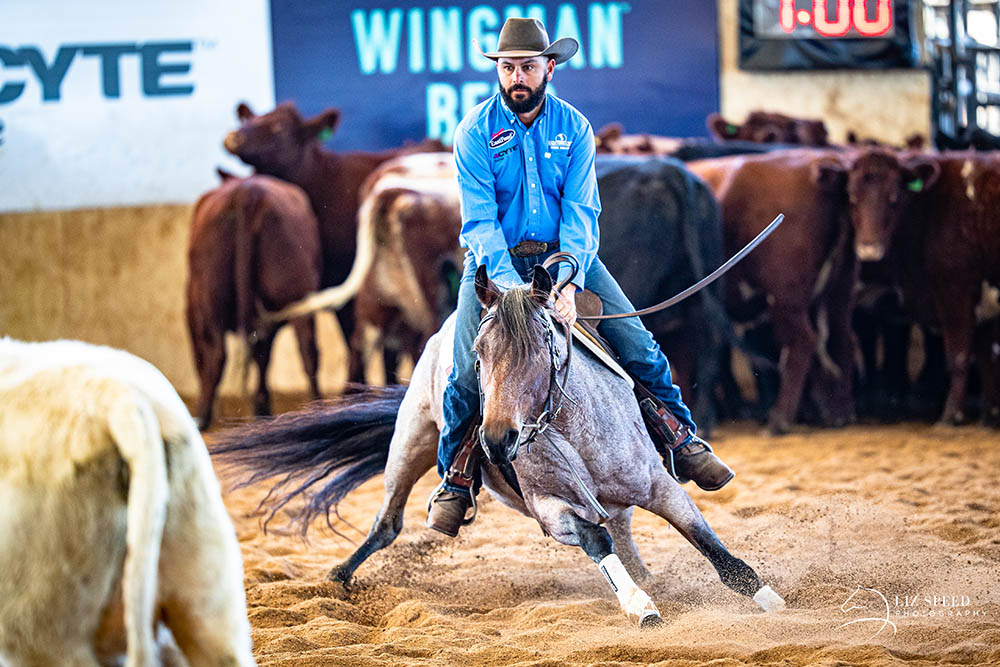
“Things are definitely starting
to ramp back up.”
BACK ON THE ROAD
Now that the weather is improving and restrictions lifting, Dan Steers is looking forward to getting back out and about. “I’ve just done two three-day clinics and I have another shortly. Things are definitely starting to ramp back up, which is good and just in time for the summer… I don’t like the cold!”
Competition wise, there is also some action on the horizon and Dan says that after having a little more time to spend on his own horses recently, he’s excited to put that work to the test. Dan typically competes in Stockman’s Challenges, which consist of two phases: a “dry” section where horse and rider perform a routine without cattle, similar to a reining pattern, and then a working section that involves cattle in a similar way to a campdraft course.
“My last competition was the Cloncurry Stockman’s Challenge – which is a very famous challenge – over 2,000km away in outback Queensland before the border shut in July. The next three competitions that have been announced are coming up in the next three to four weeks and are reasonably local.”
Besides Stockman’s Challenges, Dan also has an interest in snaffle bit cutting and reined cowhorse events – the latter essentially being a cross between cutting and reining. “Recently I’ve dabbled with snaffle bit cutting at Futurity events, mainly because it gives horses a really good foundation; I really like how it helps to set my campdraft and sale horses up, so I have been doing more of that. The reined cowhorse industry has also started to expand in recent years, so we’ve been using our reining foundation [both Dan Steers and Dan James have had success over the years in the reining arena, with Dan James most recently representing Australia at the 2018 World Equestrian Games in the USA] and cowhorse foundation to get horses prepared for that as well.”
Getting back to competitions, Dan is excited about his young horses who will be getting out for the first time. “I’ve got three just-four-year-olds who should have done a couple of events as three-year-olds, but didn’t due to the pandemic,” explains Dan. He points out that when you’re first heading out to a competition with a young horse – or even heading back to the competition arena with an older horse who’s had time off – it’s important to make sure everything is in order at home first.
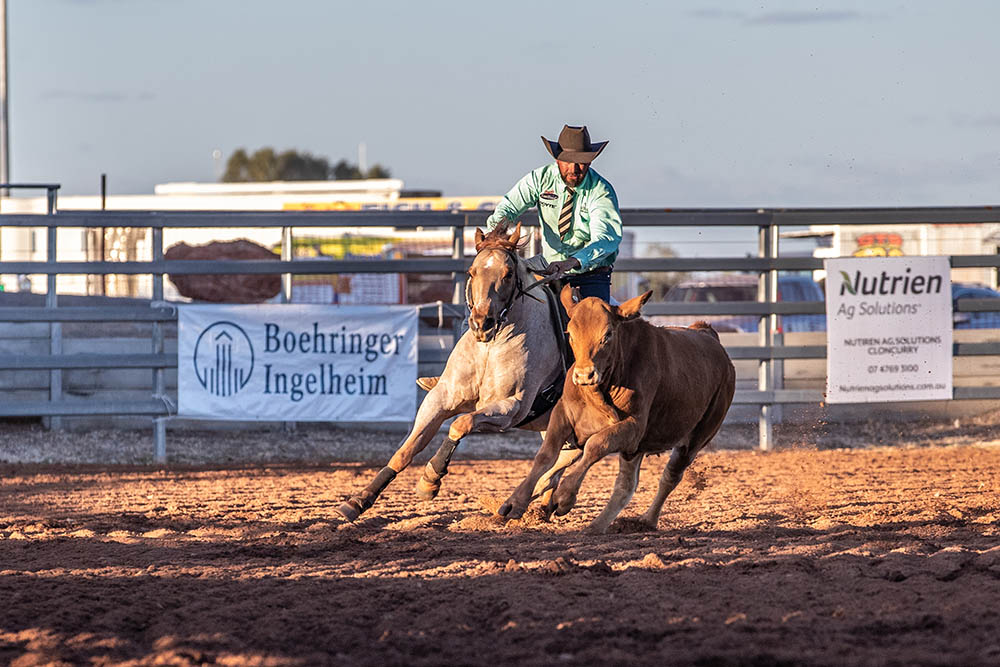
SOUND AS A BELL
“Making sure your horse is sound, that’s number one as a horseman,” says Dan. Ensuring your horse is sound and comfortable to perform the task at hand is of course critical, however, picking up very subtle issues isn’t always easy.
“A professional that’s working a horse and thinks ‘this horse would normally perform better than this’… you’ll see them step off and start looking at the horse’s reaction to pressure points on the body or flexion tests. They’re not just getting stuck into the horse for having a lazy day. If they are a good horse person, 99% of the time they are right, and there is something there. Unfortunately, less experienced trainers and owners might not have had the experience working with true professionals and it’s harder for them to pick up these smaller issues.
“If I suspect there’s an issue, my first port of call is consulting with my vet – and I’m very lucky, because that is my wife, Pia – and getting an opinion and looking to find out what the issue may be, if any. If there are no issues with them, that can give me the confidence to persist in training the behaviour – but if I believe there’s something physical, I work on that first and foremost.”
However, while Dan stresses the importance of ensuring your horse is sound, he notes you’ve also got to be careful that you’re not making excuses. “I hear it a lot dealing with horses that have major behavioural issues; owners will have 99 excuses for that horse and often that’s what they are – excuses. So you do have to be careful that we’re not going, ‘oh, well my horse is bucking so he must have a sore back’ or, ‘he’s rearing, so he must be out in his poll’. In my mind, if my horses are not feeling their best, they don’t show this by rearing or bucking; under extreme circumstances, a horse might do that, but in this scenario it’s more often because people have misread the horse and haven’t picked up on the early signs of physical soreness and that persisted and eventually led to something more dramatic. But in my experience, serious issues such as rearing and bucking are more likely to be behavioural.”
Dan has long been a fan of 4CYTETM EPIITALIS®FORTE Gel joint supplement for use with his horses, and more recently he and Dan James became ambassadors for the product. “My competition horses are on it, as is pretty much anything that I think might need it – even if they are paddock horses or semi-retired. My Stock Horse stallion, Double Image, is 17 now and he gets pulled out for the odd show here and there, whether it’s for competition or entertainment. He stays on 4CYTETM, and probably what I’d be doing with him is upping his dose if I was getting ready for a major event – even though he has no issues – just to ensure he’s feeling his best.”
As Dan explains, it’s not just the older horses that benefit from 4CYTETM. “I’ve got a four-year-old mare who has the knees of a teenage horse who’s been in full-time work since they were a young horse… and she’s only a young horse and she hasn’t had the stresses that her knees suggest. It’s just how she is.” Recognising something was amiss with her early on, Dan had her X-rayed and was told to not worry about training her because she wouldn’t have any longevity with her knees the way they were. “I really liked the mare when I started her, so we put her on a double dose of 4CYTETM (the loading dose of 8ml). When we re-did the X-rays, they said one thing but her lameness examination said another; she wasn’t as lame as what the imaging suggested she should be. Now, after an extended period on 4CYTETM, her lameness is non-existent.
“That mare is getting ready for competitions now,” says Dan, explaining that she’s one of the first-time competitors he’s planning to take out in a few weeks to a snaffle bit cutting competition. “She’s one of my favourite horses that I ride and so I’m looking forward to showing her. The proof’s going to be in the pudding; she’s a four-year-old so we’re far from her competing into her teens yet, but she feels really good and sound.”
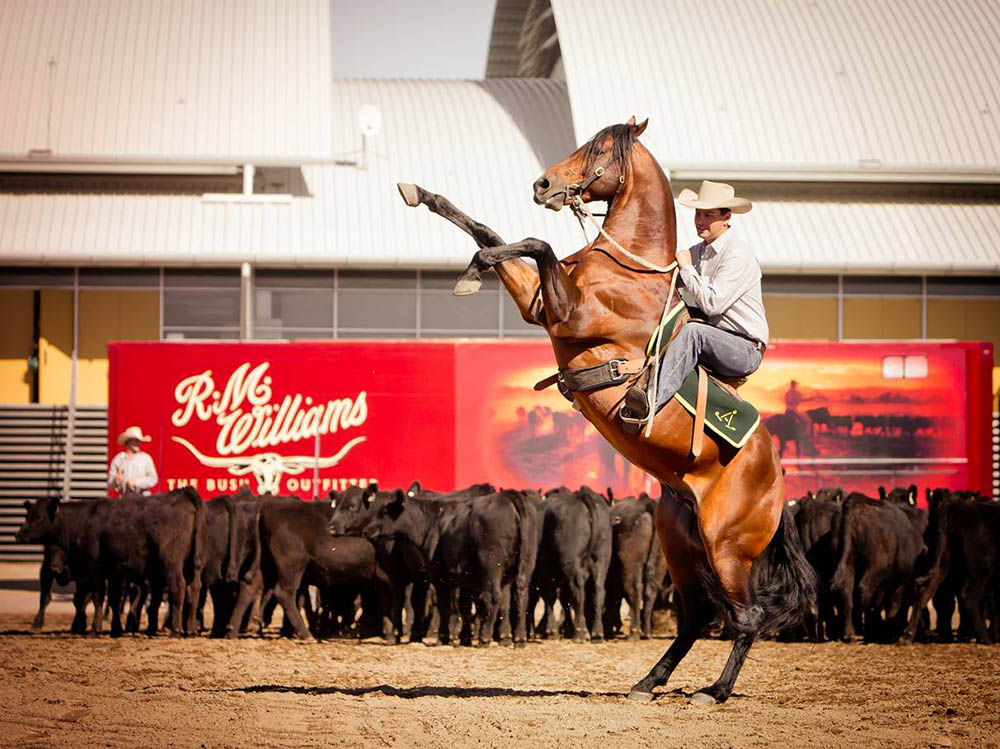
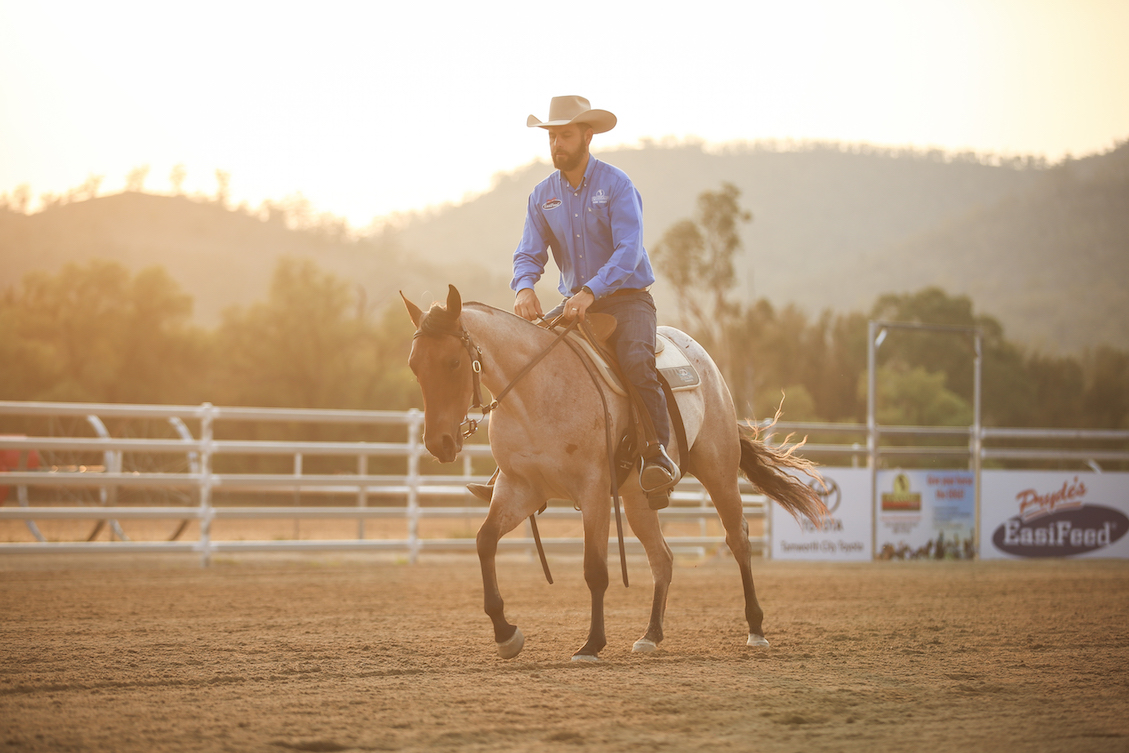
FITNESS FIRST
In addition to ensuring your horse is sound, building enough fitness is also very important before getting out and about. While the pandemic has given Dan more time to spend working his horses – and therefore they are fit and ready to compete – if a horse has instead spent some of this forced downtime in the paddock then it’s important to make sure they are brought back into work carefully.
“If you’ve used this opportunity to turn your horse out, and he’s been on a holiday, then you’re both probably a little bit rusty and out of condition. We need to work first and foremost on rider and horse fitness in preparation. If something’s a bit fat and out of shape, it shouldn’t be brought in and drilled into work and made to do physical things; it is no different to us. And if something’s got a bit of age on it, then it needs to be warmed up carefully and ideally kept in some sort of fitness.
“If you are eager to get out and take your horse away, but you feel like you haven’t prepared him well enough at home, then I would certainly suggest taking him to a horsemanship clinic, or a training day or lessons to try and blow the cobwebs out and work in a training sense, so that the pressure of competition isn’t there for you or the horse. Just ease yourself back into it, otherwise I don’t think it’s fair on the horse and I don’t think you’re going to have the best ride or find it enjoyable.”
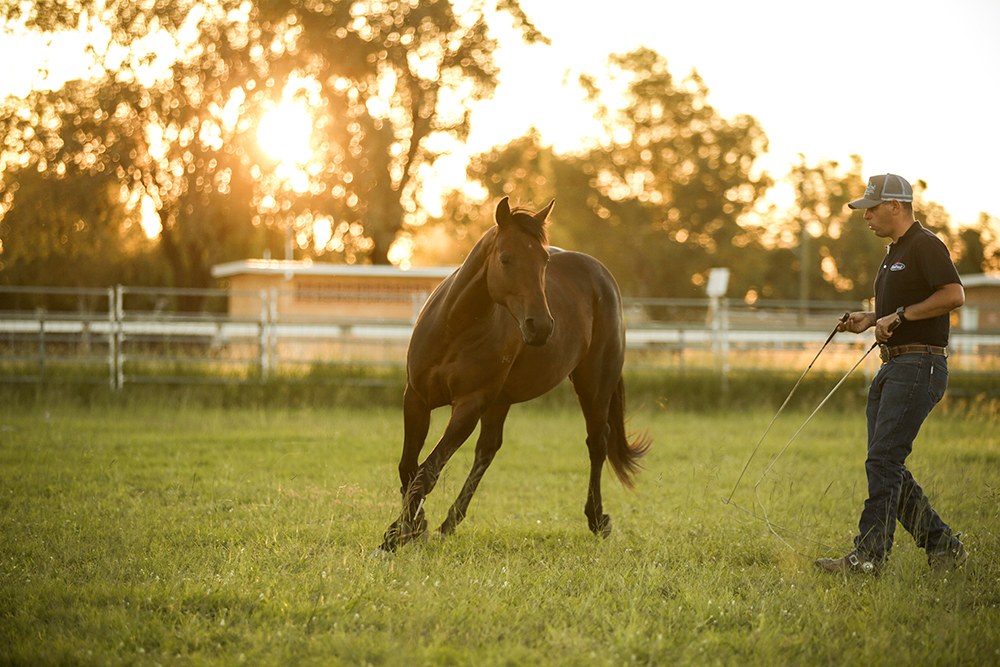
“When I ride a horse,
it’s like a two-horse herd.”
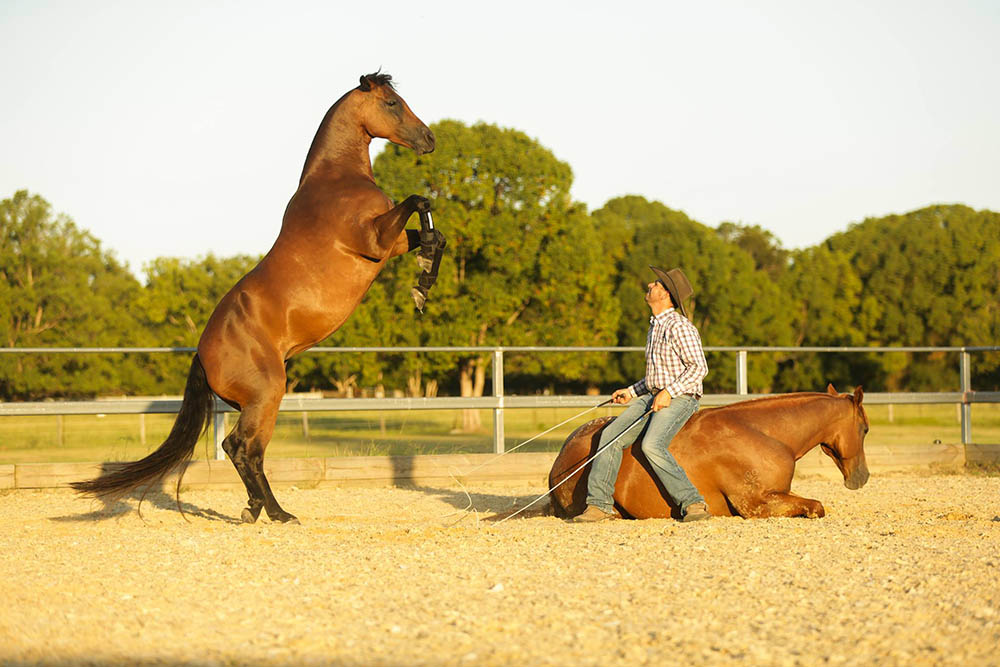
BE THE LEADER OF YOUR ‘TWO-HORSE HERD’
From a behavioural perspective, there are many things your horse needs to be comfortable with before heading out and about – you could write a book on the topic – however one thing in particular that’s important is being happy away from home in a new environment.
“If you’re playing the game Family Feud, and you surveyed 100 horse people and they had to tell you their horse’s biggest problem, the top answer would probably be separation anxiety,” says Dan. “In short, if somebody asks me about that in a clinic, I explain that the main things is to be really working on the partnership between you and your horse. When I ride a horse, it’s like a two-horse herd; we just have to be focused on each other and the horse needs to follow my lead and then they’re never separated from the herd so to speak… they’re always with their herd, which is myself as the rider.
“Having this partnership isn’t just important when going out to a competition; it’s also important when you’re riding in groups, for example when trail riding. Even if the horses are not necessarily friends or are paddocked together or even from the same property, when you go out for a trail ride they’ll buddy up and turn themselves into their own herd; they will feed off each other instead of the riders. You see that a lot. Often, at clinics when people are asked to introduce themselves and their horses, they will say ‘I do dressage’ or ‘I do jumping’… and then somebody will say, ‘I just trail ride’. Well you don’t just trail ride; that’s a discipline in itself if you do it properly. Many people around the world might be really tough competitors in a lot of disciplines, but they can’t necessarily just go for a trial ride.
“You do have to work on that at all times so that your horse looks to you for security. If you feel the horse get disconnected from you, you have to have drills and manoeuvres – essentially questions that you ask the horse – to get that horse to chime back in and look for your leadership again.
“Take the example of a liberty horse. People say, ‘What do you do when they run off?’. They don’t ‘run off’; they get disconnected. And they get disconnected because they lose concentration. I work on that concentration and make the horse focus on whatever it is we’re doing at that point, and whatever we’re doing needs to also be a reward for the horse – not pressure.
“If you’re aggressive with a horse, he’s not going to look at you as a leader. He’s going to look at himself and have his own preservation in mind; he’s going to make sure he stays safe, and do the best that he can do in that situation. It’s about being directive and confident with your horse and getting your horse to listen to you. And you don’t practise that by going away to competitions. You start that at home.
“I don’t find that I have an issue with separation anxiety in my horses because I work so strongly on that connection. If I do, it’s very fleeting; taking young horses out for the first time, of course it’s like anybody’s young horse, but as soon as I go into those drills and ask those questions like I’ve trained at home, it’s pretty much nipped in the bud and they’re fine. And that’s how everyone’s horses should essentially be.”
Having a sound, fit and happy horse that’s ready for competition takes a multi-faceted approach; diet, veterinary care and supplements such as 4CYTETM, proper farrier attention and careful training to ensure they are physically and mentally ready for the job at hand. “These are all the things we need to do as an owner and rider if we expect our horse to be an equine athlete,” says Dan.
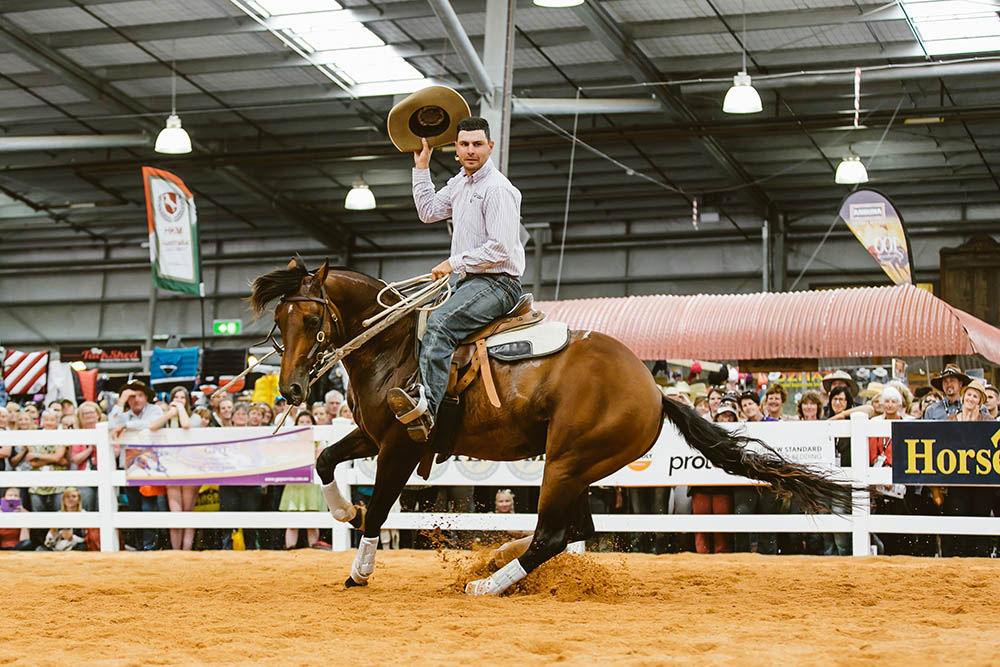
DOUBLE DANS REUNITE
With clinics ramping up and competitions on the horizon, Dan is looking forward to getting back on the road – and in particular he can’t wait to join the other half of Double Dan Horsemanship in America next year. “Now there are really only two things holding me back: my visa is expired, and my actual passport has expired!” he laughs. Once that paperwork is out of the way, Dan hopes he’ll be heading over to the States next year – when the weather is good, of course. “When it warms… you can’t go over there at least until the end of April. I don’t like cold weather!” EQ
This article was written in conjunction with Interpath; you can find out more about 4CYTE for horses here.
YOU MIGHT ALSO LIKE TO READ:
Lucinda Green’s Joint Venture – Equestrian Life, September, 2021

